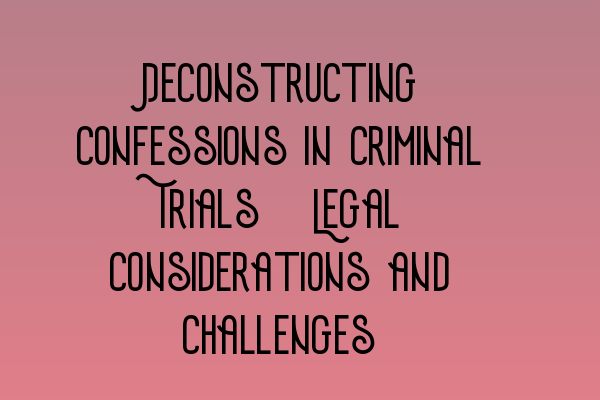Deconstructing Confessions in Criminal Trials: Legal Considerations and Challenges
Welcome to the SQE Criminal Law & Practice Law UK blog. In this article, we will delve into the complex and fascinating world of confessions in criminal trials. Confessions play a critical role in determining guilt or innocence, but their admissibility and reliability can present significant legal challenges.
The Importance of Confessions in Criminal Trials
Confessions are a powerful piece of evidence in criminal trials. They can provide a direct admission of guilt by the accused, making it difficult for the defense to refute the charges. However, confessions are not infallible and can be subject to various legal considerations.
Voluntariness and the Right to Silence
One of the key legal considerations when evaluating a confession is its voluntariness. The right to silence is a fundamental principle in criminal law, and any confession obtained through coercion, duress, or improper inducements may be deemed inadmissible.
The case of R v Singh highlighted the importance of ensuring that confessions are made voluntarily. In this case, the defendant’s confession was ruled inadmissible as it was obtained through oppressive police behavior.
Corroborative Evidence and Reliability
Confessions, while powerful, are not always reliable. It is essential to consider corroborative evidence to support the veracity of a confession. This can include physical evidence, witness testimonies, or expert analysis.
Expert testimonies can play a crucial role in bolstering the reliability of a confession. These professionals can provide specialized knowledge and analysis, such as psychological evaluations or linguistic analysis, to help determine the credibility of a confession.
False Confessions and Coerced Confessions
False confessions are an unfortunate reality in some criminal trials. Factors such as psychological pressure, coercion, or the desire to protect others can lead innocent individuals to admit guilt falsely.
The case of R v Ibrahim shed light on the issue of false confessions. In this case, the defendant’s confession was found to be coerced and unreliable due to the prolonged and oppressive police interrogations.
Challenges in Evaluating Confessions
Evaluating confessions presents several challenges for legal professionals. The complexities of human psychology, the potential for manipulation, and the myriad of external factors involved make the task of assessing confessions a delicate process.
It is crucial for solicitors and legal practitioners to have a deep understanding of the legal considerations and challenges surrounding confessions. This knowledge allows them to effectively represent their clients and ensure that justice is served.
Conclusion
Confessions are a critical aspect of criminal trials, but their admissibility and reliability must be carefully evaluated. Understanding the legal considerations, such as voluntariness, corroborative evidence, false confessions, and challenges in evaluation, is essential for any legal professional involved in criminal law.
